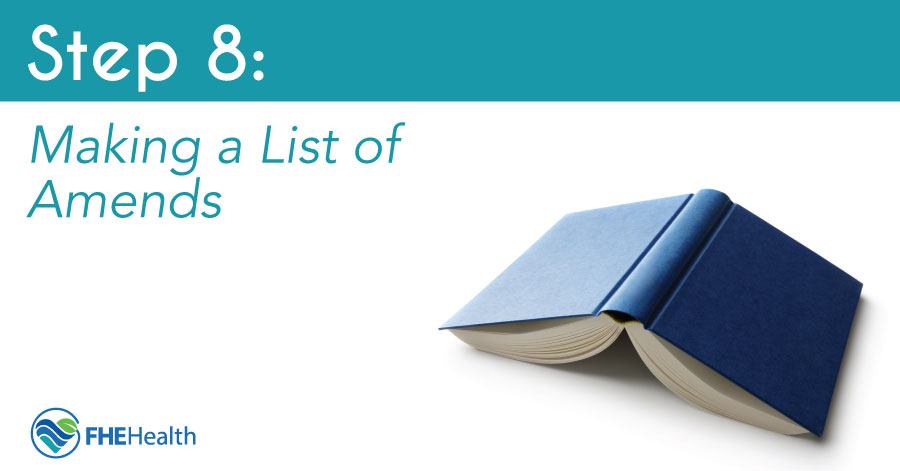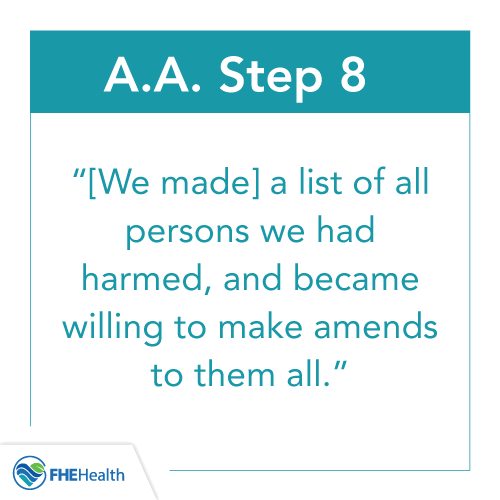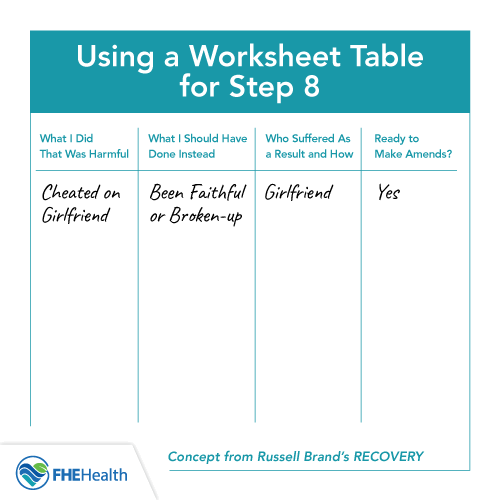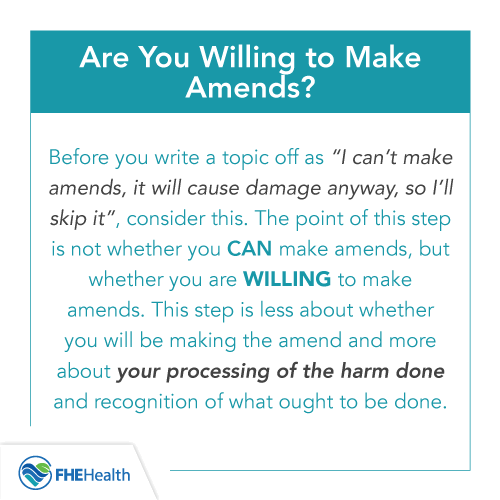
Step 8 of AA is primarily about forgiveness — making peace with others and yourself. Stepping back from a life of alcoholism and seeing all the damage you caused can be devastating. This is a key moment, when you’ll finally be coming to terms and learning how to live with what’s salvageable in your life, even if those things are no longer the same. It takes courage to continue the 12 Steps of Alcoholics Anonymous.
What Is Step 8 of AA?
 According to AA.org, in Step 8 of the program: “[We made] a list of all persons we had harmed, and became willing to make amends to them all.”
According to AA.org, in Step 8 of the program: “[We made] a list of all persons we had harmed, and became willing to make amends to them all.”
The 8th Step leads you to the knowledge that there are things you can and can’t change by identifying who you’ve harmed and how you’ve harmed them and then making a list. Now is the time to be open and honest. Think about any instances of selfishness, greed, dishonesty, negligence and so on, regardless of whether or not you intended to cause harm at the time.
Seeing this list helps you understand the impact you have on the world around you, the responsibility you have and will hold you accountable for dealing with it. And that willingness to make amends will be essential when you’re ready to go on to Step 9.
Are You Ready for Step 8 AA?
Completing Step 7 is the only way to successfully prepare for Step 8. The previous step, building on all the introspective ones before it, requires you to admit your shortcomings and ask for them to be removed by a higher power. The vulnerability and courage you need to complete this task aid you when facing something more challenging: the real-world effects alcoholism has had on your relationships.
Ask yourself if you’ve truly embraced humility and given yourself over to a higher power. If not, don’t proceed until you know Step 7 is really complete.
Sitting Down and Doing Step 8
 Starting the list is the most frightening part of Step 8 of AA, which is why it’s so important to actually do it. Don’t delay because you’re afraid of confronting it. You may feel uneasy and worry about whether you can actually make amends, but forget about this for the moment.
Starting the list is the most frightening part of Step 8 of AA, which is why it’s so important to actually do it. Don’t delay because you’re afraid of confronting it. You may feel uneasy and worry about whether you can actually make amends, but forget about this for the moment.
Step 8 Worksheet
Many people find it easier to use a step 8 worksheet (or make their own table) with two columns: 1) person harmed and 2) harm done to that person. Some add a third column for possible amends.
If you used a worksheet on Step 4 to catalog the mistakes you have made or your current resentments, it can be very useful to go line by line and consider who is currently was hurt by these events. This can be an excellent prompt for your Step 8 worksheet, but it should expand beyond that worksheet if possible.
However you make your list, be sure you don’t restrict or censure yourself. You can even include your own name to acknowledge the self-harm you’ve caused and want to heal. It should be expansive.
You may find it helpful to make notes next to some of the entries; for example, you could write something you value about a person next to their name in the harmed column, or you could write a prayer or spiritual excerpt next to a harm you’ve caused. This reminds you that the spirit of the eighth Step goes beyond forgiveness and includes compassion, honesty, humility and other qualities built up in previous steps.
Once you’ve made a thorough list, many people find it helpful to break it up into four categories:
- Amends to make now (now that you’ve reached sobriety)
- Partial amends (so as to avoid harm or injury to others)
- Amends to make later
- Amends that may never be made
This can take a very long time, months or even a year for some, but you shouldn’t rush it. Other people who have completed this task might tell you how freeing it is, and while that may be true, trying to take a shortcut is is only limiting the power that this step will bring to your recovery.
What Constitutes Harm?
Consider everything when making your list — big and small. Try not to worry whether someone’s still alive or has passed away or if they care about you and what you did.
Go ahead and put them down. The goal is to catalog everything, just as you previously did with character defects and the moral inventory.
Some harms may be explicit, such as stealing money, neglecting debt, committing a crime and verbally abusing loved ones. Others may take a bit of soul-searching. Less direct forms of harm should also be included, such as your absence and when you’ve let people down. A good question to ask yourself when considering what constitutes harm is: “Am I at fault?”
To really forgive yourself and move on to your new life, you need to take responsibility for past actions and come to accept them. This means you may end up admitting that you owe amends to people you hate or who have caused you harm.
Step 8 Checklist
 Step 8 of AA may be one of the most difficult. The continuous self-reflection you must do to complete this step might raise doubts about your recovery, it can be difficult to look at a list of the damages you’ve caused without wanting to seek an escape. Because of this it’s important to work through this step with your sponsor.
Step 8 of AA may be one of the most difficult. The continuous self-reflection you must do to complete this step might raise doubts about your recovery, it can be difficult to look at a list of the damages you’ve caused without wanting to seek an escape. Because of this it’s important to work through this step with your sponsor.
Don’t forget that a Step 8 table has two parts. You not only identify harms but also have to be willing to amend them. This means understanding the harm you’ve done in a way that recognizes your fault and need for amending. If you identify a harm that you are unwilling to amend, you have some more soul-searching to do on the issue!
Remember that you’ll soon be dealing with concrete artifacts from your past. Before you move on, be honest with yourself by asking deep, meaningful questions such as:
- Have I done anything to show I’m willing to make amends?
- Are there people I listed who I feel unwilling to make amends with? Why?
- Am I afraid of making direct amends?
- Have I accurately accounted for the harms I’ve caused?
- Am I truly willing to make amends, or am I interested in using the relationship for personal gain? If so, should I consider revisiting the previous steps in the program?
- How would my life be different if I’d already made these amends?
If truthful answers to these questions reveal that you’re not ready to move on, or that you may even need to go back to earlier steps, set the list aside for later. Next time, you’ll be in a better position to accept your shortcomings and align with the path to fix them.
When you decide to work with FHE Health, you discover the importance of giving yourself time to recover. Step 9 won’t work without forgiveness, and our compassionate team will help you rebuild your relationships, let go off past damage and embrace a new lifestyle free of guilt.
Our 12-Step Series:
- Why the 12-step Program Still Works
- Step 1: Why the 12-step Journey Begins with Powerlessness
- Step 2: What is a Higher Power?
- Step 3: God as you Understand Him
- Step 4: Your Moral Inventory
- Step 5: Admitting Your Wrongs
- Step 6: Addressing Character Defects
- Step 7: Removing our Defects
- Step 8: Willing to Make Amends
- Step 9: Making Amends, How to Approach Step 9
- Step 10: Ongoing Inventory
- Step 11: How to Deepen Your Connection with a Higher Power
- Step 12: Sharing Your Spiritual Awakening With Others
- Understanding AA Lingo






